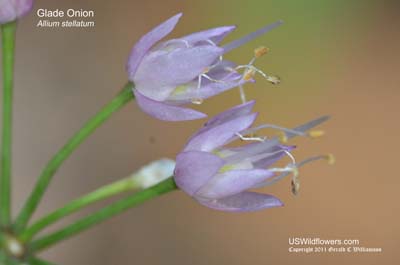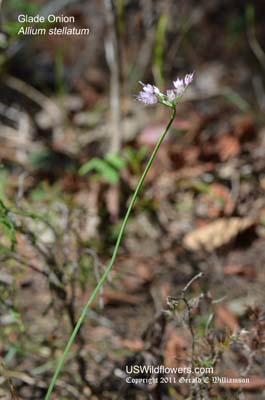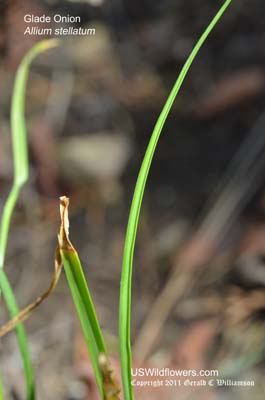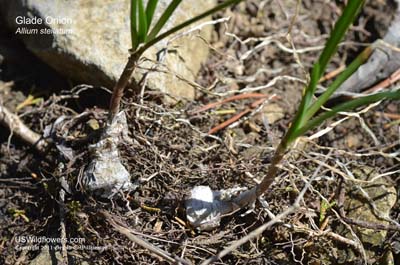Glade Onion, Prairie Onion, Cliff Onion, Autumn Onion, Lady's Leek, Wild Onion - Allium stellatum
|
Allium stellatum - Glade Onion, Prairie Onion, Cliff Onion, Autumn Onion, Lady's Leek, Wild Onion.
Note: 9/6/2013 - After seeing more specimens at the location where these photos were taken, and doing further research on Allium cernuum and Allium stellatum, I am not sure whether this is Allium cernuum or Allium stellatum. There is a bit of nod remaining in the umbel, but that is not a certain characteristic. The flowers seem more campanulate than stellate, implying cernuum. The bulb seems more ovate than elongate, implying stellatum. I'm leaning toward cernuum.
The USDA still lists Allium in the Liliaceae family, although some recent classification efforts have moved it into the Amaryllidaceae - Amaryllis - family. Since ITIS lists the genus in Amaryllidaceae, I have included the Allium species in that family here as well.
Glade Onion grows in thin soils over limestone; frequently found in cedar glades. It is also found in rocky prairie soils, and thus in some areas carries the common name Prairie Onion.
Allium stellatum is Endangered in Tennessee, and is not even listed by the USDA as being found in Georgia, although that is where these photographs were taken. The plant was shown to me by Jay Clark, at what is likely the easternmost extent of its range.
Similar Allium Species:
- Allium canadense - Bulbils present in inflorescence.
- Allium cernuum - Nodding inflorescence vs the upright inflorescence in A. stellatum.
- Allium vineale - Bulbils form after or during anthesis. Leaves are round in cross-section.
Found in:
AR, GA, IA, IL, IN, KS, MI, MN, MO, ND, OK, SD, TN, TX, WI, WY
Leave comments on Allium stellatum at this link. | 
Distribution of Allium stellatum in the United States and Canada:

Blue=Native; Grey=Introduced
Map from USDA Plants Database:
USDA, NRCS. 2017. The PLANTS Database (http://plants.usda.gov, 08 May 2025). National Plant Data Team, Greensboro, NC 27401-4901 USA.
Search Our Database: Enter any portion of the Scientific, Common Name, or both.
Do a general Google search of the entire site:
#ad
 Follow USWildflowers on Twitter
#ad
| | Site: Blue Hole Area, Pigeon Mountain, Walker County, GA Date: 2011-September-24 | Photographer: Gerald C. Williamson
Nikon D7000
| | The inflorescence of A. stellatum has 9 to 40 star-like pink to red flowers on pedicels up to an inch long. The specimens here are past their prime, not showing the full beauty of the plant. There are no bulbils (bulbets) in the inflorescence. | | 
| | Site: Blue Hole Area, Pigeon Mountain, Walker County, GA Date: 2011-September-24 | Photographer: Gerald C Williamson
Nikon D7000 | | Stamens and pistil extend well beyond the pink to red tepals. | | Click on the photo for a larger image

| | Site: Blue Hole Area, Pigeon Mountain, Walker County, GA Date: 2011-September-24 | Photographer: Gerald C Williamson
Nikon D7000 | | The solitary scape is round or somewhat flattened and up to about 18 inches tall. The inflorescence may nod initially but will be erect by full-bloom, unlike the similar onion, Allium cernuum. | | Click on the photo for a larger image

| | Site: Blue Hole Area, Pigeon Mountain, Walker County, GA Date: 2011-September-24 | Photographer: Gerald C Williamson
Nikon D7000 | | The 3 to 5 narrow, grass-like leaves are flat with a channel, so the leaf would have a slight v-shape in cross section. They may be up to a foot tall, and may be withering or withered by anthesis. | | Click on the photo for a larger image

| | Site: Blue Hole Area, Pigeon Mountain, Walker County, GA Date: 2011-September-24 | Photographer: Gerald C Williamson
Nikon D7000 | | The bulbs of these Glade Onions had been uncovered by some recent heavy rains. These will normally be buried almost up to the point where the leaves appear.
| | Click on the photo for a larger image

|
References used for identification and information:
|
|
| |
| #ad
|
|







